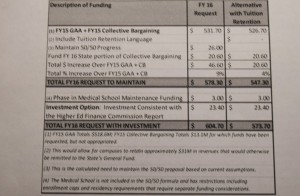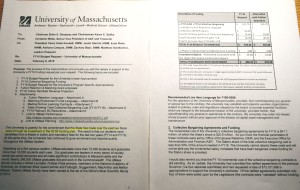
Copy of UMass Budget Request Form for Fiscal Year 2016, shows a chart detailing the description of funding requested.
At the University of Massachusetts, tuition and fees for in-state students totaled $1,996 for the 1986-87 school year, according to the UMass Undergraduate Student Charges Fact Sheet compiled by the Office of Institutional Research. For the 2014-15 year, tuition and fees charges increased to $13,258. This increase is largely due to the reduction in state funding for higher education.
State universities and community colleges enroll 73 percent of all college students, according to a March 2014 Chronicle of Higher Education article titled “Equalizers No More.” However, between 1990-91 and 2009-10 (both recession periods), state governments decreased their funding to these institutions by an average of 26 percent in real terms, even as operating costs increased.
